Search
Search within East Asia and the Pacific
21 results found
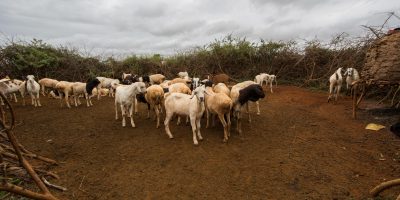
Journal Article
COVID-19 and pastoralism: reflections from three continents
How have COVID-19 disease control measures affected mobility and production practices, marketing opportunities, land control, labour relations, local community support and socio-political relations with the state and other settled agrarian or urban populations? This article reflects on five diverse cases…
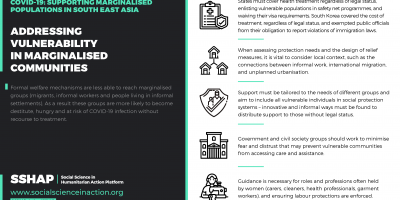
Infographics
COVID-19 Supporting Marginalised Populations in South East Asia
Formal welfare mechanisms are less able to reach these vulnerable groups.
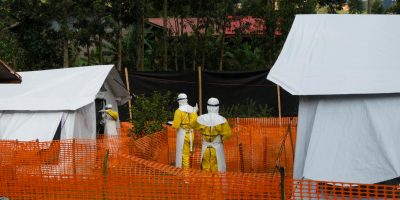
Evidence Reviews
Social Science in Epidemics: Influenza and SARS Lessons Learned
Summary and background reports exploring transmission, surveillance and other aspects of outbreaks.

Background Reports
The SARS-Associated Stigma of SARS Victims in the Post-SARS Era of Hong Kong
This article explores the disease-associated stigma attached to the SARS victims in the post-SARS era of Hong Kong. The author argues that the SARS-associated stigma did not decrease over time. Based on the ethnographic data obtained from 16 months of…

Background Reports
Middle East Respiratory Syndrome Risk Perception among Students at a University in South Korea, 2015
The 2015 Middle East respiratory syndrome (MERS) outbreak in South Korea was a serious threat to public health, and was exacerbated by the inappropriate responses of major institutions and the public. This study examined the sources of confusion during the MERS…

Background Reports
Attitudes towards Zika Virus Infection among Medical Doctors in Acehprovince, Indonesia
Zika virus (ZIKV) infection, a public health emergency of international concern, has recently been confirmed in Indonesia. However, to date, there has been no study to assess how prepared healthcare workers in Indonesia are to confront this emerging infectious disease.…
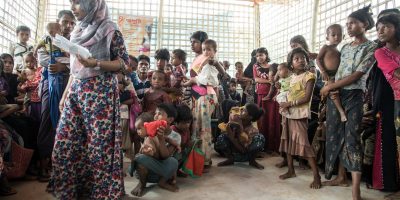
Background Reports
Gender-Based Violence Among Documented Rohingya Refugees in Bangladesh
The Rohingya, a Muslim minority group from the northern part of Rakhine State (formerly Arakan) in Myanmar, is among the most vulnerable of the world’s refugee communities. This study aims to shed light on gender-based violence among documented Rohingya refugees…
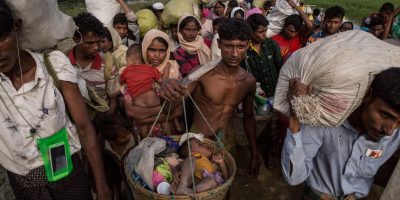
Evidence Reviews
Social and Cultural Factors Shaping Health and Nutrition, Wellbeing and Protection of the Rohingya Within a Humanitarian Context
More than half a million Rohingya refugees, 60% of them children (UNICEF 2017), have crossed the border into Bangladesh, joining refugee camps or settling informally, and are in dire need of basic services such as food, health care, and protection.…

Background Reports
Ethno-Demographic Dynamics of the Rohingya-Buddhist Conflict
Ethno-demographic grievances define the conflict between Buddhist and Rohingya-Muslim populations in the Rakhine State of Myanmar. Due to the government’s decision to avoid the enumeration of self-identifying Rohingya, this study has relied on several recent local surveys to reconstruct a…
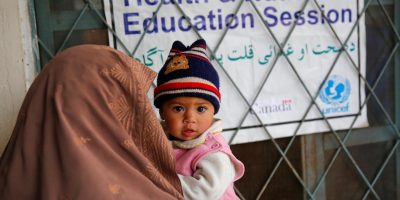
Background Reports
Strategic Review of DFID support to the Health and Population Sector in Pakistan and Recommendations for Future Support
The objective of this strategic review is to produce evidence-based options and recommendations for DFID’s strategy for engagement in Pakistan’s health and population sector over the next 3-5 years.The report suggests approaches that will work with- rather than just through–…

Evidence Reviews
Visions, Voices and Priorities of Young People Living With and Most Affected by HIV
This report shares perspectives and insights from young people from around the world living with and affected by HIV, who share their visions for realising and claiming their sexual and reproductive health and rights (SRHR) and for setting priorities for…

Evidence Reviews
Health and the Urban Transition. Effects of Household Perceptions, Illness, and Environmental Pollution on Clean Water Investment
Recent efforts to reinvigorate the connections between urban planning and health have usefully brought the field back to one of its original roles. Current research, however, has focused on industrialized cities, overlooking some of the important urbanization processes in poor…


